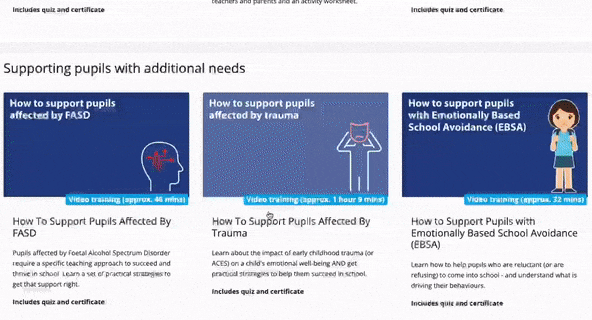
How To Motivate Students Intrinsically
When kids are motivated intrinsically, they want to do the right thing... because it's the right thing! Here's how to use intrinsic motivation in your classroom to increase pupil engagement and success.

How To Resolve Arguments With Your Friends
This done-for-you presentation is designed to help children understand conflict and provide them with the necessary skills to resolve these situations independently. Includes a poster, tips sheets for teachers and parents and an activity worksheet.

How to prevent meltdowns
Learn what drives pupils with autism to experience meltdowns... plus 15 simple, practical strategies you can use in your classroom to prevent meltdowns from happening in the first place.

How To Use Mindful Moments to Help Students Regulate Their Emotions
If you're working with individuals or classes who become overwhelmed by their emotions, teaching these specific mindfulness techniques can really help.

How To Easily Defuse Confrontations
Challenging behaviour is on the rise - so it's important to know how to defuse confrontations quickly and confidently. Here are 3 easy strategies anyone can learn to achieve success.

Back on task
Curb classroom disruption with our 3 proven scripts for managing challenging students. Use them in your class today and put the focus back on teaching and learning.

Managing Feelings Presentation
A done-for-you presentation about managing anger you can use with the children in your primary school.

How To Build Strong Relationships With Parents And Carers
Having strong home-school relationships is essential for the success of any school. This module gives you a step-by-step process for building those relationships, starting today.

How To Support Pupils With Sensory Needs
Learn how unmet sensory needs can actually fuel emotional dysregulation in students - and the secrets of the three overlooked senses that have a big impact on pupil behaviour. Includes 42 practical sensory support strategies.

How To Nail The Basics Of Classroom Management
Whether you are brand new to teaching, or a seasoned pro... confidently executing these basic classroom management techniques will have a dramatic impact on how your entire class responds to you.

How To De-escalate Like A Champion
Learn the secrets of the anger-cycle, amygdala hijack and our 'firebreak formula' to successfully manage emotion-fuelled confrontations.

How To Win Agreement In Difficult Meetings With Parents
Sometimes meetings with parents about their child's behaviour can lead to disagreement - and quickly sour. Here's how to get those meetings right so you maintain positive home/school relationships.

How To Use Emotional Scaling
Do you teach pupils who struggle to manage strong emotions like anger - and who lose control at the slightest trigger? Lean how to use emotional scaling to help them.

Lunchtime Masterplan
You'll walk away with a step-by-step masterplan for transforming lunchtimes that's specific to your school. You'll make lunchtimes for your students the best they can be... starting today.

How to Support Pupils with Emotionally Based School Avoidance (EBSA)
Learn how to help pupils who are reluctant (or are refusing) to come into school - and understand what is driving their behaviours.

How To Connect With Your New Class
Connecting with your new class from day one is vital for success. In this training, we give you practical ways of building rapport with your pupils and fostering a positive learning environment.

How To Help Pupils Manage Transitions
Teach students how to cope with transitions by scaffolding their experience and building coping skills to manage change.

How To Minimise Low-Level Disruption
If constant low-level disruption is driving you mad and disrupting your lessons, I'll help you to work out what function these behaviours serve and what you can do to get the focus back onto teaching and learning.

Neurodiversity: What It Is And Why It's So Important
A done-for-you presentation that explains neurodiversity in a simple way... and explores why having an inclusive classroom is positive for everyone. Includes a poster, tips sheets for teachers and parents and an activity worksheet.

How To Support Children Who Have Experienced Domestic Violence
Domestic Violence (DV) can have a significant impact on a child's emotional and social development. Learn what that impact is - and how to support your students in the classroom.

How to set out your classroom for behaviour success
The classroom environment has a huge impact on student behaviour. Here's how to get yours right... by making small (but powerful) changes that improve student focus and minimise negative behaviour.

How to support parents with their child's diagnosis
Getting a diagnosis for their child can be a rollercoaster of emotions for parents. Here's how to support them on that journey.

Online Bullying: What It Is And How To Get Help
A done-for-you presentation about online bullying to use with your pupils. Includes a poster, tips sheets for teachers and parents and an activity worksheet.

How To Establish A Successful Nurture Group
Some children may need additional nurture to succeed, especially if they have experienced trauma. Find out how to create a non-threatening learning environment where all children can grow.

ADHD Calm and refocussed
Imagine your pupils with ADHD are calm, engaged and focussed on learning. Here are 6 simple things you can do to make that happen.

How To Support Pupils Affected By FASD
Pupils affected by Foetal Alcohol Spectrum Disorder require a specific teaching approach to succeed and thrive in school. Learn a set of practical strategies to get that support right.

Problem-free Playtimes
Want the children in your primary school to spend lunchtimes playing games that keep them active, occupied and happy? You're going to have everything you need to make this happen.

How To Manage Challenging Conversations With Parents
Ever had to deal with parents who are disgruntled, angry or downright rude? You're not on your own! These strategies will put you back in the driver's seat - so you feel cool, calm and in control.

How To Motivate Change In Hard-To-Reach Pupils
Learn why behaviour interventions often fail with hard-to-reach students - and how to finally engage them in positive behaviour change.

How To Support Pupils Affected By Trauma
Learn about the impact of early childhood trauma (or ACES) on a child's emotional well-being AND get practical strategies to help them succeed in school.

How to write targets that actually change behaviour
Finally: a step-by-step guide for writing behaviour targets that actually drive change (harnessing the latest behavioural science)

How To Use Feedback Loops To Change Behaviour
Learn the strengths and weaknesses of feedback loops (systems of rewards and consequences) - and how best to leverage them to improve behaviour in your classroom.

How To Support Pupils With Autism
Struggling to connect with your pupils who have autism? Then learn the latest science behind the condition... as well as effective classroom strategies you can start using today to positively impact your pupils.

How To Support Students With Pathological Demand Avoidance
Get these practical strategies for helping pupils with PDA move away from controlling (or disruptive) classroom behaviours.

How to coach pupils through strong emotions
Use our simple 3-step communication strategy to help your pupils thrive emotionally and socially. Teach them how to self-regulate by recognising, naming and managing their own stress responses.

How To Structure A Restorative Conversation
Learn this simple technique to teach children how to resolve conflict successfully - for themselves - through restorative conversations.

How To Use Comic Strip Conversations
Learn how to use comic strip conversations to communicate with pupils who struggle to understand social situations.

How to reset behaviour with tricky classes
Sometimes, you get a tricky class where behaviour gets in the way of learning. Here's how to put classroom behaviour back on the right track, even part way through the year.

How To Support Pupils With Oppositional Defiant Disorder
Find out what drives the behaviour of pupils with ODD... plus support strategies that will finally help them achieve their potential in the classroom.

How To Support Pupils With Grief and Loss
Find out what children of different ages and stages understand about death and how their behaviour is affected by grief. Learn exactly what you can say and do to support your pupils during this incredibly difficult time.

Is it bullying?
A done-for-you presentation about the difference between bullying and meanness. Includes a poster to print and display, tips sheets and an activity worksheet.

How To Teach Emotional Regulation To Pupils
Working with students who find it hard to regulate their feelings? Use this practical, step-by-step guide to teaching self-regulation to get them back on top of their emotions.

How To Help Pupils Reframe Confrontation
Do some of your students believe the world is out to get them - and overreact to even the smallest problem? This simple resource will help them choose a different response to life's difficulties.

How To Use Praise To Improve Classroom Behaviour
Want more positive behaviour in your classroom? Then knowing how to use effective praise is essential. Here's how to get praise right (and how to make sure it doesn't backfire on you!)

How to Support Pupils With Attachment Needs
Discover how parenting styles influence children's attachment styles. Learn what to do (and what to avoid) if you're working with pupils who have an insecure attachment with their primary caregiver.

How To Promote Your Pupils' Independence
Students learn better in an environment where they are encouraged to think and act independently. In this module, we explore how to create a classroom ecosystem that encourages independent thinking.

How To Support Students With Anxiety And Fear
Do you work with a pupil whose anxiety stops them realising their potential? Use this science-based approach to help them get over their fears and succeed in the classroom.





